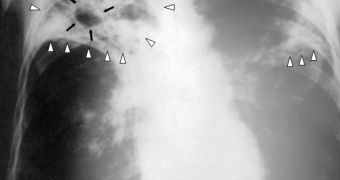According to geneticists, new strains of tuberculosis originating in Russia are developing increased antibiotics resistance, as well as a knack for infecting hosts faster than ever before. This is very dangerous in the current globalized society, where infections can spread like wildfire.
Researchers were recently able to discover a series of new mutations that enabled TB – a condition caused by the organism Mycobacterium tuberculosis – to become immune to numerous antibiotics.
These results were obtained from the largest whole-genome study ever conducted on a single bacterial species to date. A total of over 1,000 genomes were analyzed, from a wide variety of TB isolates.
Scientists believe that the extremely high incidence of tuberculosis in Russia and other countries from behind the Iron Curtain after 1990 was triggered in part by the collapse of the Soviet Union, and its integrated healthcare system, Nature News reports.
The reason why TB strains in this region are becoming resistant to drugs is that some patients receive partial or incomplete antibiotic regimes. This means that not all of the microorganisms infecting them are killed; those that remain evolve to become immune to the drugs that were used as treatment.
These conclusions belong to a study published in the January 26 issue of the top scientific journal Nature Genetics. The work reveals that biological factors may have also played an important role in allowing TB to acquire resistance to antibiotics. The study was carried out on a total of 2,348 patients.
In addition to resilience-related mutations, investigators from the Queen Mary University of London, and colleagues, were also able to identify a series of “compensatory mutations” that enabled the virus to spread faster and more efficiently, thus becoming even more deadly.
The team determined that around 50 percent of the TB isolates in this research were immune to at least two of the main line drugs used to treat this disease. Around one sixth of all isolates were immune to one or more second line drugs as well.
“It certainly adds an extra layer of worry, because one had assumed if you could solve programmatic weaknesses, you would solve the problem of the drug-resistant TB. But this does seem to be a biological problem as well,” says QMU expert and lead study author, Francis Drobniewski.
“Although we know the general story of TB drug resistance in Russia, these new findings are still shocking. Truly scary,” comments World Health Organization epidemiologist, Christopher Dye.

 14 DAY TRIAL //
14 DAY TRIAL //